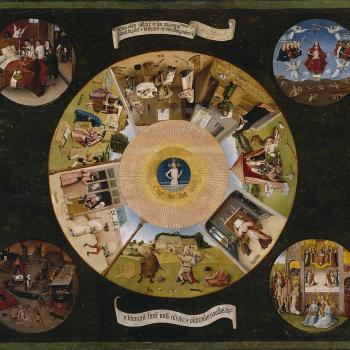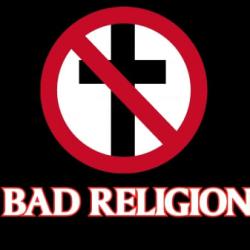Exodus 20:5: “visiting the iniquity of the fathers upon the children to the third and the fourth generation”

Exodus 20:5-6 (RSV, as throughout) you shall not bow down to them or serve them; for I the LORD your God am a jealous God, visiting the iniquity of the fathers upon the children to the third and the fourth generation of those who hate me, [6] but showing steadfast love to thousands of those who love me and keep my commandments. (cf. identical passage Deut 5:9-10)
She wrote:
I was always taught that God doesn’t punish children for the sins of their parents, what does this mean? This is in direct opposition to that. Yeah, I’ve heard it said that naturally the children are going to suffer from their parents’ sins. For instance, if their father is an alcoholic, there are going to be repercussions that will affect the children – maybe for several generations. You know, that sort of thing. But it seems that here, God is specifically saying “I will punish the children for the sins of their fathers.” I know that often there’s that loss in translation between “God-speak” and “human-speak”, but still, it just rankles and I’d like a really good explanation if there is one.
This is an example of Hebrew hyperbole, intended, as I understand it, to show (at a very early stage of salvation history and God’s revealing of Himself) that 1) God is judge, 2) God is not to be trifled with, 3) God is sovereign, and 4) sin has consequences (expressed in the typically Hebraic exaggerated fashion).
John W. Haley, in his book, Alleged Discrepancies of the Bible (Springdale, Pennsylvania: Whitaker House, n.d.; possibly 1992, originally published in 1874, pp. 86-87) wrote:
Fellow moderator at CHNI David W. Emery made a similar observation:
[This] has to do with the natural consequences of sin. This is inevitable with every sin; if it were not, people could sin with impunity. What you are reading has to do with the Israelite tendency to attribute those consequences directly to God as their ultimate source, ignoring the secondary cause, the sinner. So this is a case of 21st century American sensibilities not matching those in the middle east from two millennia before Christ. Those people did not have the benefit (as we do) of the later discoveries of the Greeks regarding causality and logic. Times change, cultures change, and language changes. No problem to those who recognize that fact and figure it into their equation. . . . the two systems of thought are different, and we should not therefore read our own intellectual heritage into the biblical text.
There is also anthropomorphism and anthropopathism in play here (particularly in the “jealous” clause): fancy words for God attributing to Himself very human emotions and actions and even physical characteristics that usually don’t literally apply in His case. He does this (especially in the earlier stages of salvation history of propositional revelation of Himself), in order to communicate His attributes to man; otherwise, men would have only the dimmest understanding of God. In the excellent overview, “Anthropomorphisms and their Meaning” (from Old Testament Theology; Philadelphia: Westminster Press, 1957 , pp. 22-25), Ludwig Köhler explains:
[In the Old Testament] the language which ascribes to God the attributes of man is neither restrained nor incidental; indeed, anthropomorphism is to be found on every page of the Old Testament in a wealth of detail, unashamed and even drastic. God speaks, Gen. 1:3; converses, Lev. 4:1; calls, Lev. 1:1; he hears, Ex. 16:12; sees, Gen. 1:4; smells, 1 Sam 26:19; laughs, Ps. 2:4; and hisses, Isa. 7:18. . . .
Not only is God represented as possessing parts of the human body; he also has feelings and passions like those of a man. Alongside anthropomorphisms in the strict sense there are anthropopathisms. He feels delight, Jer. 9:24; shows favor, Isa. 60:10; he rejoices with joy and exultation, Zeph. 3:17. But he also rebukes, Isa. 17:13; he hates, Deut. 12:31; he rejects, Jer. 14:19; he abhors, Ps. 106:40; he feels disgust, Lev. 20:23. He is provoked to anger, Jer. 7:18, and can be jealous; indeed this is an outstanding trait of his character. While the gods of a Pantheon need to be tolerant and permit their worshippers to invoke other gods, the God of the Old Testament never ceases to insist upon his exclusiveness. “I am a jealous God,” Ex. 20:5, Deut. 5:9. . . .
Their intention is not in the least to reduce God to a rank similar to that of man. To describe God in terms of human characteristics is not to humanize him. That has never happened except in unreasonable polemic. Rather the purpose of anthropomorphisms is to make God accessible to man. They hold open the door for encounter and controversy between God’s will and man’s will. They represent God as person. They avoid the error of presenting God as a careless and soulless abstract Idea or a fixed Principle standing over against man like a strong silent battlement. God is personal. He has a will, he exists in controversy ready to communicate himself, offended at men’s sins yet with a ready ear for their supplication and compassion for their confessions of guilt: in a word, God is a living God.
Deuteronomy 24:16 The fathers shall not be put to death for the children, nor shall the children be put to death for the fathers; every man shall be put to death for his own sin.
2 Kings 14:6 But he did not put to death the children of the murderers; according to what is written in the book of the law of Moses, where the LORD commanded, “The fathers shall not be put to death for the children, or the children be put to death for the fathers; but every man shall die for his own sin.” (cf. parallel passage 2 Chronicles 25:4)
2 Chronicles 7:14 if my people who are called by my name humble themselves, and pray and seek my face, and turn from their wicked ways, then I will hear from heaven, and will forgive their sin and heal their land.
Isaiah 59:20 And he will come to Zion as Redeemer, to those in Jacob who turn from transgression, says the LORD.
Jeremiah 31:30 But every one shall die for his own sin . . .
Ezekiel 13:22 . . . you have encouraged the wicked, that he should not turn from his wicked way to save his life;
Ezekiel 18:1-24 The word of the LORD came to me again: [2] “What do you mean by repeating this proverb concerning the land of Israel, `The fathers have eaten sour grapes, and the children’s teeth are set on edge’? [3] As I live, says the Lord GOD, this proverb shall no more be used by you in Israel. [4] Behold, all souls are mine; the soul of the father as well as the soul of the son is mine: the soul that sins shall die. [5] “If a man is righteous and does what is lawful and right — [6] if he does not eat upon the mountains or lift up his eyes to the idols of the house of Israel, does not defile his neighbor’s wife or approach a woman in her time of impurity, [7] does not oppress any one, but restores to the debtor his pledge, commits no robbery, gives his bread to the hungry and covers the naked with a garment, [8] does not lend at interest or take any increase, withholds his hand from iniquity, executes true justice between man and man, [9] walks in my statutes, and is careful to observe my ordinances — he is righteous, he shall surely live, says the Lord GOD. [10] “If he begets a son who is a robber, a shedder of blood, [11] who does none of these duties, but eats upon the mountains, defiles his neighbor’s wife, [12] oppresses the poor and needy, commits robbery, does not restore the pledge, lifts up his eyes to the idols, commits abomination, [13] lends at interest, and takes increase; shall he then live? He shall not live. He has done all these abominable things; he shall surely die; his blood shall be upon himself. [14] “But if this man begets a son who sees all the sins which his father has done, and fears, and does not do likewise, [15] who does not eat upon the mountains or lift up his eyes to the idols of the house of Israel, does not defile his neighbor’s wife, 16] does not wrong any one, exacts no pledge, commits no robbery, but gives his bread to the hungry and covers the naked with a garment, [17] withholds his hand from iniquity, takes no interest or increase, observes my ordinances, and walks in my statutes; he shall not die for his father’s iniquity; he shall surely live. [18] As for his father, because he practiced extortion, robbed his brother, and did what is not good among his people, behold, he shall die for his iniquity. [19] “Yet you say, `Why should not the son suffer for the iniquity of the father?’ When the son has done what is lawful and right, and has been careful to observe all my statutes, he shall surely live. [20] The soul that sins shall die. The son shall not suffer for the iniquity of the father, nor the father suffer for the iniquity of the son; the righteousness of the righteous shall be upon himself, and the wickedness of the wicked shall be upon himself. [21] “But if a wicked man turns away from all his sins which he has committed and keeps all my statutes and does what is lawful and right, he shall surely live; he shall not die. [22] None of the transgressions which he has committed shall be remembered against him; for the righteousness which he has done he shall live. [23] Have I any pleasure in the death of the wicked, says the Lord GOD, and not rather that he should turn from his way and live? [24] But when a righteous man turns away from his righteousness and commits iniquity and does the same abominable things that the wicked man does, shall he live? None of the righteous deeds which he has done shall be remembered; for the treachery of which he is guilty and the sin he has committed, he shall die.
Ezekiel 33:1-20 The word of the LORD came to me: [2] “Son of man, speak to your people and say to them, If I bring the sword upon a land, and the people of the land take a man from among them, and make him their watchman; [3] and if he sees the sword coming upon the land and blows the trumpet and warns the people; [4] then if any one who hears the sound of the trumpet does not take warning, and the sword comes and takes him away, his blood shall be upon his own head. [5] He heard the sound of the trumpet, and did not take warning; his blood shall be upon himself. But if he had taken warning, he would have saved his life. [6] But if the watchman sees the sword coming and does not blow the trumpet, so that the people are not warned, and the sword comes, and takes any one of them; that man is taken away in his iniquity, but his blood I will require at the watchman’s hand. [7] “So you, son of man, I have made a watchman for the house of Israel; whenever you hear a word from my mouth, you shall give them warning from me. [8] If I say to the wicked, O wicked man, you shall surely die, and you do not speak to warn the wicked to turn from his way, that wicked man shall die in his iniquity, but his blood I will require at your hand. [9] But if you warn the wicked to turn from his way, and he does not turn from his way; he shall die in his iniquity, but you will have saved your life. [10] “And you, son of man, say to the house of Israel, Thus have you said: `Our transgressions and our sins are upon us, and we waste away because of them; how then can we live?’ [11] Say to them, As I live, says the Lord GOD, I have no pleasure in the death of the wicked, but that the wicked turn from his way and live; turn back, turn back from your evil ways; for why will you die, O house of Israel? [12] And you, son of man, say to your people, The righteousness of the righteous shall not deliver him when he transgresses; and as for the wickedness of the wicked, he shall not fall by it when he turns from his wickedness; and the righteous shall not be able to live by his righteousness when he sins. [13] Though I say to the righteous that he shall surely live, yet if he trusts in his righteousness and commits iniquity, none of his righteous deeds shall be remembered; but in the iniquity that he has committed he shall die. [14] Again, though I say to the wicked, `You shall surely die,’ yet if he turns from his sin and does what is lawful and right, [15] if the wicked restores the pledge, gives back what he has taken by robbery, and walks in the statutes of life, committing no iniquity; he shall surely live, he shall not die. [16] None of the sins that he has committed shall be remembered against him; he has done what is lawful and right, he shall surely live. [17] “Yet your people say, `The way of the Lord is not just’; when it is their own way that is not just. [18] When the righteous turns from his righteousness, and commits iniquity, he shall die for it. [19] And when the wicked turns from his wickedness, and does what is lawful and right, he shall live by it. [20] Yet you say, `The way of the Lord is not just.’ O house of Israel, I will judge each of you according to his ways.”
2 Maccabees 7:32 For we are suffering because of our own sins.
Matthew 23:37 O Jerusalem, Jerusalem, killing the prophets and stoning those who are sent to you! How often would I have gathered your children together as a hen gathers her brood under her wings, and you would not!
John 5:28-29 . . . the hour is coming when all who are in the tombs will hear his voice [29] and come forth, those who have done good, to the resurrection of life, and those who have done evil, to the resurrection of judgment.
Romans 2:5-13 But by your hard and impenitent heart you are storing up wrath for yourself on the day of wrath when God’s righteous judgment will be revealed. [6] For he will render to every man according to his works: [7] to those who by patience in well-doing seek for glory and honor and immortality, he will give eternal life; [8] but for those who are factious and do not obey the truth, but obey wickedness, there will be wrath and fury. [9] There will be tribulation and distress for every human being who does evil, the Jew first and also the Greek, [10] but glory and honor and peace for every one who does good, the Jew first and also the Greek. [11] For God shows no partiality. [12] All who have sinned without the law will also perish without the law, and all who have sinned under the law will be judged by the law. [13] For it is not the hearers of the law who are righteous before God, but the doers of the law who will be justified.
Romans 14:10 Why do you pass judgment on your brother? Or you, why do you despise your brother? For we shall all stand before the judgment seat of God;
2 Corinthians 5:10 For we must all appear before the judgment seat of Christ, so that each one may receive good or evil, according to what he has done in the body.
1 Timothy 2:3-4 God our Savior, [4] who desires all men to be saved and to come to the knowledge of the truth.
1 Peter 1:17 . . . who judges each one impartially according to his deeds . . .
Revelation 2:23 . . . I am he who searches mind and heart, and I will give to each of you as your works deserve.
Revelation 20:11-12 Then I saw a great white throne and him who sat upon it; from his presence earth and sky fled away, and no place was found for them. [12] And I saw the dead, great and small, standing before the throne, and books were opened. Also another book was opened, which is the book of life. And the dead were judged by what was written in the books, by what they had done.
Revelation 22:12 Behold, I am coming soon, bringing my recompense, to repay every one for what he has done.
The trouble comes when one verse is taken in isolation without regard to other relevant verses. Then it may appear that something is teaching what in fact it isn’t teaching. This is as true for the Christian (and we all make this mistake at times) as it is for the atheist who is cynically looking for “contradictions” in the Bible (one of my specialties in my apologetics: I try to answer those guys). Linguistics, context, cultural considerations of place and time, and cross-referencing are all relevant.
One primary consideration is the Hebrew word involved. Translations of Exodus 20:5 are about evenly divided between “punish,” etc. and “visiting.” Here are all the Bible translations I can find, from my library, or from online:
*
The Hebrew term paqad is Strong’s word #6485; see also the entry in Brown-Driver-Briggs Hebrew Lexicon for word usage. It is is translated in many different ways. In the KJV here is the spread (305 appearances in 270 verses):
number 119, visit 59, punish 31, appoint 14, commit 6, miss 6, set 6, charge 5, governor 5, lack 4, oversight 4, officers 4, counted 3, empty 3, ruler 3, overseer 3, judgment 2, misc 28
Moreover, it is important to determine the sense in this particular verse. Gesenius’ Hebrew-Chaldee Lexicon (listed in the online Brown-Driver-Briggs Hebrew Lexicon) appears to favor the “punish” interpretation: “to fall upon, to attack” — with emphasis on the sin to be punished. It cross-references the following passages that carry the same sense:
Exodus 32:34 But now go, lead the people to the place of which I have spoken to you; behold, my angel shall go before you. Nevertheless, in the day when I visit, I will visit their sin upon them.
Exodus 34:7 keeping steadfast love for thousands, forgiving iniquity and transgression and sin, but who will by no means clear the guilty, visiting the iniquity of the fathers upon the children and the children’s children, to the third and the fourth generation.
Numbers 14:18-20 `The LORD is slow to anger, and abounding in steadfast love, forgiving iniquity and transgression, but he will by no means clear the guilty, visiting the iniquity of fathers upon children, upon the third and upon the fourth generation.’ [19] Pardon the iniquity of this people, I pray thee, according to the greatness of thy steadfast love, and according as thou hast forgiven this people, from Egypt even until now.” [20] Then the LORD said, “I have pardoned, according to your word;
[these two passages are very interesting because they are similar to Ex 20:5 , but also provide the interpretive key within themselves: God forgives repentant sinners, but punishes the guilty]
Isaiah 13:11 I will punish the world for its evil, and the wicked for their iniquity;
I will put an end to the pride of the arrogant, and lay low the haughtiness of the ruthless.Hosea 1:4 And the LORD said to him, “Call his name Jezreel; for yet a little while, and I will punish the house of Jehu for the blood of Jezreel, and I will put an end to the kingdom of the house of Israel. (cf. 2:15)
Hosea 4:9 And it shall be like people, like priest; I will punish them for their ways, and requite them for their deeds.
***
Meta Description: Explanation of what God “visiting the iniquity of the fathers upon the children to the third and the fourth generation” means.
Meta Keywords: Judgment, God’s providence, God’s grace, third and fourth generation, Bible difficulties, biblical genre, hyperbole, biblical idiom, anthropomorphism, anthropopathism

















